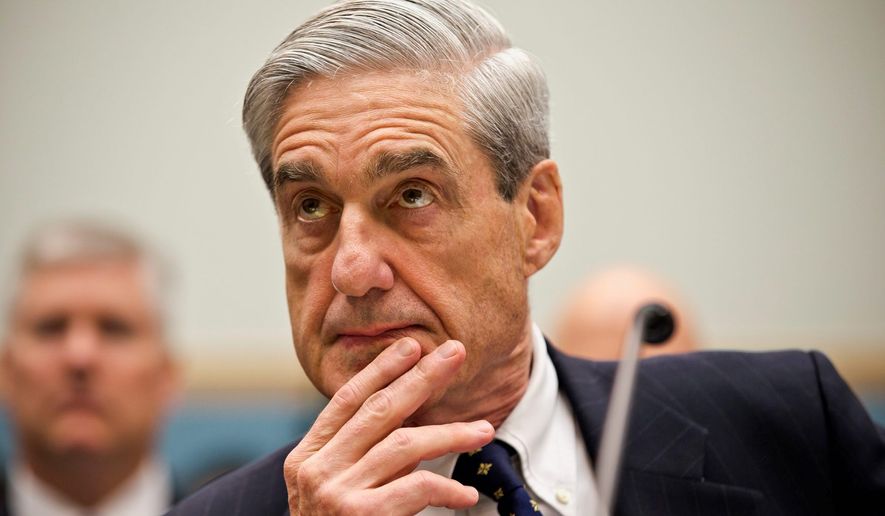Special counsel Robert Mueller has impaneled a grand jury to issue subpoenas and compel witness testimony as he probes Russian interference in the presidential election, including a June 2016 meeting between Donald Trump Jr. and a Russian lawyer, according to news reports.
The move is not surprising, said legal analysts, describing it as a natural step that allows Mr. Mueller to have access to evidence needed for a criminal probe.
“In a case like this, where you have a lot of documents that are going be necessary, grand jury subpoenas are a pretty early phenomenon,” said Philip Allen Lacovara, a former U.S. deputy solicitor general who served as counsel to Watergate special prosecutors.
The grand jury is sitting in Washington and has been active for several weeks, The Wall Street Journal reported.
In response, Mr. Trump railed against the accusations of collusion, telling a rally in West Virginia that the entire Russia narrative was a ruse by Democrats trying to reverse their unexpected losses in November.
“Democrat lawmakers will have to decide. They can continue their obsession with the Russian hoax, or they can serve the interests of the American people,” the president told the thousands of supporters who filled an arena in Huntington.
“They are tying to cheat you out of the leadership you want with a fake story that is demeaning to all of us and most importantly demeaning to our country and demeaning to our Constitution,” he said. “I just hope that the final determination is a truly honest one, which is what the millions of people who gave us our big win in November deserve.”
Reuters reported that the special counsel has already used the grand jury to subpoena records related to Mr. Trump’s eldest son and his meeting with Russian lawyer Natalia Veselnitskaya during the presidential campaign.
Grand juries conduct their work in secret, with news of their actions typically breaking only when they return criminal indictments. While prosecutors ask grand juries to consider whether there is evidence to indict someone of a crime, analysts say, the impanelment of one in the Russia case is not an indication that an indictment is likely or imminent.
Special counsel spokesman Joshua Stueve declined to comment on the investigation.
Jay Sekulow, an attorney for President Trump, said a grand jury was not a cause for alarm.
“With respect to the impaneling of the grand jury, we have no reason to believe that the president is under investigation,” he said in a statement to The Washington Times.
The White House confirmed this week that Mr. Trump helped craft his son’s statement that indicated the meeting was about Russian adoptions and not the campaign or other related issues.
The president’s son later released email correspondence that showed he agreed to the meeting after being promised compromising information on Democratic presidential nominee Hillary Clinton.
Before Mr. Mueller was appointed to oversee the Russia investigation, a grand jury was assembled in Alexandria, Virginia, to consider evidence against former National Security Adviser Michael Flynn. It is unclear what happened to that grand jury or why Mr. Mueller opted to use a panel in Washington.
The shift could be one of convenience — Mr. Mueller and his team have office space in Washington — or it could be that actions under investigation, such as Mr. Trump’s dismissal of FBI Director James B. Comey, took place in the nation’s capital and make it the right venue to pursue potential crimes.
Ty Cobb, special counsel to the president, said he wasn’t aware that Mr. Mueller had started using a grand jury.
“Grand jury matters are typically secret,” Mr. Cobb said. “The White House favors anything that accelerates the conclusion of his work fairly. … The White House is committed to fully cooperating with Mr. Mueller.”
He noted that Mr. Comey said three times that the president was not under investigation, and Mr. Trump’s team has no reason to believe that has changed.
But Democrats saw the news as confirmation that the special counsel’s investigation is not a “witch hunt,” as Mr. Trump has called it.
“As the investigation proceeds, it is more important than ever that all of our leaders draw a line in the sand and make clear to the president that he must respect the rule of law and refrain from continuing the pattern of threats and interference he has engaged in over the past several months,” said Democratic National Committee CEO Jess O’Connell. “The American people deserve answers, and they deserve a president who will allow our system of justice to produce them.”
A bipartisan group of lawmakers did take action Thursday to protect the integrity of the investigation.
Sens. Thom Tillis, North Carolina Republican, and Christopher A. Coons, Delaware Democrat, introduced a bill that would write into law current department guidelines governing who can fire a special counsel and make them retroactive to this year’s appointment of Mr. Mueller.
The bill also would create a judicial review should a president try to remove a special counsel. That way, if Mr. Mueller or any future special counsel is fired, then the decision could be challenged before a special panel of three federal judges.
“It is critical that special counsels have the independence and resources they need to lead investigations,” Mr. Tillis said. “A back-end judicial review process to prevent unmerited removals of special counsels not only helps to ensure their investigatory independence, but also reaffirms our nation’s system of check and balances.”
⦁ Stephen Dinan contributed to this report.
• S.A. Miller can be reached at smiller@washingtontimes.com.
• Andrea Noble can be reached at anoble@washingtontimes.com.




Please read our comment policy before commenting.